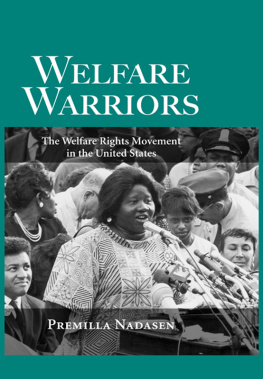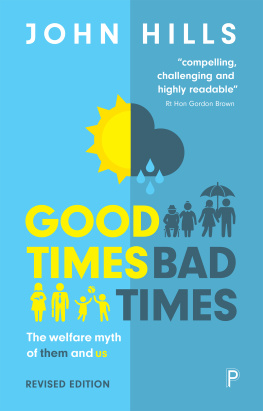Reformed American Dreams
Welfare Mothers, Higher Education, and Activism
SHEILA M. KATZ
Rutgers University Press
New Brunswick, Camden, and Newark, New Jersey, and London
Library of Congress Cataloging-in-Publication Data
Names: Katz, Sheila Marie, author.
Title: Reformed American dreams : welfare mothers, higher education, and activism / Sheila M. Katz.
Description: New Brunswick : Rutgers University Press, 2019. | Includes bibliographical references and index.
Identifiers: LCCN 2018042830 | ISBN 9780813594347 (paperback) | ISBN 9780813594354 (cloth)
Subjects: LCSH: Low-income single mothersUnited StatesSocial conditions. | Low-income single mothersEducation (Higher)United States. | Welfare recipientsEmploymentUnited States. | United StatesSocial policy20th century. | Social movementsUnited States. | BISAC: SOCIAL SCIENCE / Social Classes. | EDUCATION / Higher. | EDUCATION / Inclusive Education. | SOCIAL SCIENCE / Womens Studies. | SOCIAL SCIENCE / Discrimination & Race Relations.
Classification: LCC HQ759 .K34748 2019 | DDC 361.6/140973dc23
LC record available at https://lccn.loc.gov/2018042830
A British Cataloging-in-Publication record for this book is available from the British Library.
Copyright 2019 by Sheila M. Katz
All rights reserved
No part of this book may be reproduced or utilized in any form or by any means, electronic or mechanical, or by any information storage and retrieval system, without written permission from the publisher. Please contact Rutgers University Press, 106 Somerset Street, New Brunswick, NJ 08901. The only exception to this prohibition is fair use as defined by U.S. copyright law.

The paper used in this publication meets the requirements of the American National Standard for Information SciencesPermanence of Paper for Printed Library Materials, ANSI Z39.48-1992.
www.rutgersuniversitypress.org
Manufactured in the United States of America
1996
Higher education for the middle class, work first for the poor was the message millions of low-income single mothers in college received from the 1996 U.S. welfare reforms. For many, their American Dream of pursuing higher education as a route off of welfare and out of poverty ended on August 22, 1996. President Bill Clinton signed the Personal Responsibility and Work Opportunity Reconciliation Act (PRWORA) that day, which created the Temporary Assistance for Needy Families (TANF) program, and reformed the U.S. welfare system. This social policy shift ended welfare as a social entitlement program and emphasized a work first approach for the poor. Welfare reform drastically reduced higher educational opportunities for low-income single mothers. Unaware of this massive shift in American poverty policy, I started my junior year as a sociology major at the University of Georgia three weeks later. I walked into my first major-level course, Josephine Beoku-Bettss Sociology of Poverty and Discrimination. She started the course with the simple questionWhat is poverty?and asked each student to write down an answer. Most of us wrote down brief answers about meeting basic needs or not being homeless or hungry. The woman who was sitting in front of me wrote a long, detailed, personal narrative about being able to feed her son, buy essentials (such as toilet paper and tampons) not covered by food stamps, and being able to complete her higher education. The class was stunned. I was stunned, too, and then intrigued. Her openness on the first day of class about having been a teenage mom, going on welfare, living in poverty, and now being a college student was surprising, refreshing, startling, and graphic.
She was a single mother on welfare pursuing her college education, like me a junior-year sociology major, and very worried about how the recent welfare reform changes would affect her. Georgias welfare system was already less than fully supportive of her pursuit of higher education while on welfare, but she had fought her way through the bureaucracy of both the welfare system and the financial aid system to go to college. She had earned an associates degree at a community college and transferred to the University of Georgia for her bachelors degree. She was finally taking courses to complete her major and was just two years from graduating. Then welfare reform was passed. The new federal welfare policies were even worse for participants pursuing education, and she was deeply worried. She openly wondered how the new policies would affect her chance of completing her undergraduate degree. We became friends during that course, and I learned more about her experiences on welfare and in higher education over the next two years. We graduated at the same time in 1998 yet lost touch after graduation. Her perspective and perseverance stayed with me. Her trepidation and biting critique of welfare reform resonated.
2001







 The paper used in this publication meets the requirements of the American National Standard for Information SciencesPermanence of Paper for Printed Library Materials, ANSI Z39.48-1992.
The paper used in this publication meets the requirements of the American National Standard for Information SciencesPermanence of Paper for Printed Library Materials, ANSI Z39.48-1992.